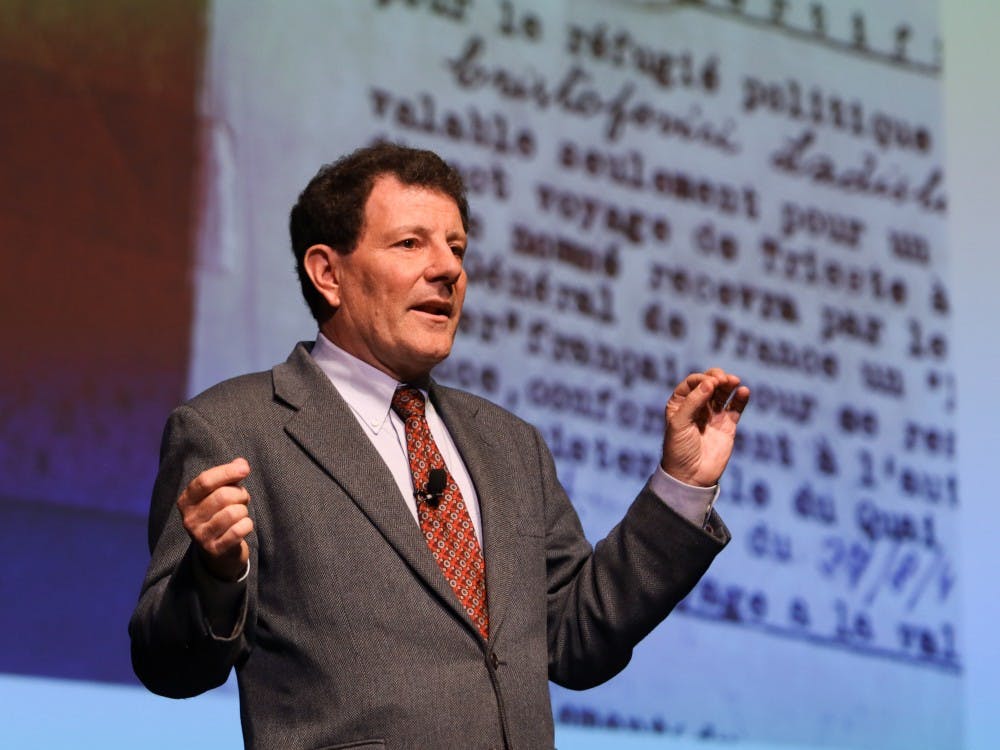“How many of you here today were either born abroad or have a parent that was born abroad?” Nicholas Kristof, Pulitzer prize winning columnist from the New York Times, asked his audience this Thursday. “How many of you have at least one grandparent that was born abroad?”
“I think we sometimes forget how much antagonism and animosity those earlier waves of immigration aroused as well, for reasons that in many ways are parallel to the anxiety that immigration today has aroused,” Kristof, son of a Romanian immigrant, said.
For the keynote address at the Provost Forum, Nicholas Kristof detailed the continued strain of antagonism towards immigrants throughout American history, describing it as an antecedent to some of the conflicts that we’re facing today.
“When today a president refers to Mexicans as rapists and murderers, that’s an offspring of a long tradition of resentment, bigotry and antagonism,” Kristof said.
Kristof also brought up the antagonism towards Jews during World War II as a mirror for our current views towards Syrian refugees. After Kristallnacht, Kristof stated that 94% of Americans disapproved of Nazi treatment of Jews, but 72% opposed taking in large numbers of Jews, a contradiction that parallels the United States’ current sympathy for—yet unwillingness to take in—large numbers of Syrians.
“Journalists did too much to recklessly and sensationally give claim to these kinds of claims and didn’t do enough to humanize those whose lives were at stake,” Kristof said, pointing to journalists as a part of a much larger problem.
He stressed that journalists have a moral obligation not to exaggerate the risks of allowing immigrants into a country and to humanize those that are trying to come and protect their families.
Kristof turned to detailing the narratives of Central American families he had conversed with and focused on two families in particular, the family of Elena and the family of Ana Jorge Jorge.
Elena’s family left Honduras because a gang leader asked her, at 14 years old, to be his “girlfriend,” a request that if refused could mean her being gang-raped and shot.
Ana Jorge Jorge, a resident of Guatemala, lived in a village devastated by drought, rendering her completely unable to pay off debts owed by her late husband. Two of her three children had died, and her third child was out of school and working in the fields to try to make ends meet.
“Food doesn’t grow here anymore. That’s why I would send my son north,” Kristof said, recalling Jorge’s comments to him.
Kristof also spoke of fear as the driving force behind some of the country’s past bad decisions. The fear of Japanese Americans during World War II prompted American racism and bigotry toward them, he asserted.
Kristof then discussed some of the “legitimate debates to have about the trade-offs and the policies that we have on immigration,” making clear that there are complexities within the immigration debate that he did not initially appreciate.
He also said that we can learn lessons about how to address problems in the future.
Stressing that the next 50 years will only see more climate-driven migration, Kristof argued that the United States needs to acknowledge the role climate change plays in immigration.
It’s also important to work to improve governance in countries that many people leave, he argued, as people are more likely to flee governments that are corrupt and societies that are broken. The United States can have real influence in pressuring countries to help impoverished workers and address gang violence, he said.
However, he recognized that there is no one solution to the problem. He spoke of the notion of collective small “drop-in-a-bucket” actions that make up larger structural change.
“Drops in a bucket—that is indeed how we can fill buckets,” Kristof said. “And that is something we can do to help immigration, to help humanize the larger issues.”
Get The Chronicle straight to your inbox
Signup for our weekly newsletter. Cancel at any time.

Preetha Ramachandran is a Trinity senior and diversity, equity and inclusion coordinator for The Chronicle's 118th volume. She was previously senior editor for Volume 117.

